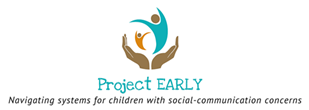Project EARLY: Engagement, Assessment, Referral, & Linkage for Young Children

Project EARLY
A study to assess the effectiveness of primary-care based family navigation (FN) intervention versus traditional care management in:
- shortening the time to diagnosis among children suspected to have ASD
- shortening the time to deployment of ASD services among those diagnosed;
- improving engagement with ASD services
With a population of 340 families of children ages 15 to 27 months who are referred for a developmental evaluation at Boston Medical Center, Children’s Hospital of Pennsylvania or Yale.
Project EARLY Study Measures
- Primary outcomes: diagnostic interval and time to engagement in ASD/recommended services
- Patient-centered/ Family Outcomes: social support, family stress, parental and family functioning (parental physical and mental health)
- Additional data: CORE ASD symptoms (ADOS), child cognitive functioning (ABAS, Mullen, Vineland), and family use of supports
Family Navigation
For all families intervention began at time of confirmed positive screen and continued for 100 days post diagnostic resolution.
Family navigation intervention:
- manualized core intervention
- 3 core in-person visits; yearly boosters
- active outreach to families
- ongoing individualized contacts via phone, text, email to address family needs
- cultural concordance
Family navigators were trained during a 4 day workshop on behavior change strategies, and training in ASD and community services.
Care management intervention:
- clinic-based
- available by phone
- contacts initiated by families
- addressed needs identified by families
2nd Autism Diagnostic Observation Schedule (ADOS)
Overview: We are looking to complete a second ADOS (Autism Diagnostic Observation Schedule) assessment for children enrolled in Project EARLY to track children’s stability of symptoms over time. The first ADOS is completed as part of standard care during the child’s developmental assessment at the clinic, but an additional ADOS is not part of the standard of care at any of the research sites. This second ADOS will be done about a year after the initial ADOS.
Vineland/Mullen Measures
Overview: Common measures required by NIMH (National Institute of Mental Health) administered at 12-month follow up to access child cognitive function.
Evaluating Implementation of a Patient Navigator Intervention to Improve Access to Diagnostic and Treatment Services for Children with Autism Spectrum Disorder
Overview: We are looking to understand the implementation of the family navigation protocol in Project EARLY as well as parents’ satisfaction with and perception of family navigation. To do this, we are conducting interviews with research staff, clinicians, navigators, and parents about their experience when using Family Navigators.
Infant-Toddler (IT) Checklist
Overview: This study serves as a supplement to Project EARLY and is examining the use of a new questionnaire, the Infant-Toddler Checklist (IT Checklist), for children between the ages of 11-20 months to see if we can identify any possible concerns sooner. We want to see if the IT Checklist works better than the questionnaires currently used – the Parents’ Evaluation of Developmental Status (PEDS) which families complete beginning at 6 months, and the Modified Checklist for Autism in Toddlers Revised with Follow Up (MCHAT-R/F) which families complete at their child’s 18 and 24 month checkups.
Contributors
Family Navigators: Jenny Acevedo, Andrea Chu, Plyce Fuchu, Mitsouka Exantus, Ivys Fernandez-Pastrana, Julianna Gardener, Samia Omer
Boston Medical Center: Emily Feinberg, ScD CPNP (PI); Marilyn Augustyn, MD; Sarabeth Broder-Fingert, MD; Howard Cabral, PhD; Yaminette Diaz-Linhart, MPH; Jenna Eilenberg, MPH; Nicole Melita, Julia Levinson, MSc; Greg Patts, MPH
Children’s Hospital of Pennsylvania: Amanda Bennett, MD (site PI); Manju Abraham, MSc; Nathan Blum, MD; Samantha Corrati, James Guevara, MD MPH
Yale: Carol Weitzman, MD (site PI); Marisol Credle, MA; Ada Fenick, MD; Ashly Gonzalez